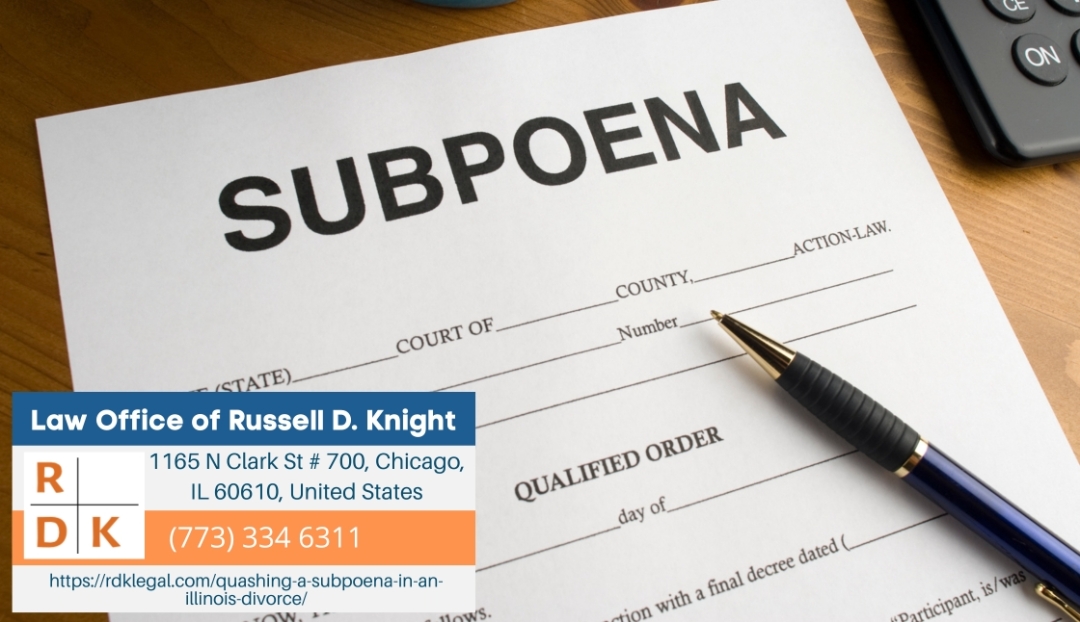Illinois divorce attorney Russell D. Knight (https://rdklegal.com/quashing-a-subpoena-in-an-illinois-divorce/), of the Law Office of Russell D. Knight, sheds light on a crucial aspect of divorce litigation: quashing subpoenas. In divorce cases, subpoenas are frequently used to gather evidence or testimony from third parties, but there are instances where their validity can be challenged. Knight explains the legal framework for quashing subpoenas in Illinois divorce proceedings and outlines how parties can protect themselves from unreasonable demands.
A subpoena is a legal instrument that compels an individual or entity to produce documents or testify in a legal proceeding. In divorce cases, attorneys often utilize subpoenas to obtain information from third parties that may be relevant to the case. According to Illinois Supreme Court Rule 201(b)(1), parties are entitled to "full disclosure regarding any matter relevant to the subject matter involved in the pending action." The Illinois divorce attorney notes that this broad scope underscores the importance of subpoenas in uncovering necessary information during divorce litigation.
Illinois divorce attorney Russell D. Knight emphasizes that while subpoenas are essential, there are circumstances where their issuance may be inappropriate or overly burdensome. In such cases, the affected party has the right to file a motion to quash the subpoena. As stated in 735 ILCS 5/2-1101, "For good cause shown, the court on motion may quash or modify any subpoena." This provision allows the court to annul or make void a subpoena if it deems the request unjustified.
The process of quashing a subpoena involves several critical steps. Initially, the party seeking to quash must file a motion with the court, articulating the reasons why the subpoena should be annulled or modified. Common grounds for such a motion include arguments that the subpoena is overly broad, seeks irrelevant information, or imposes an undue burden on the party receiving it. Russell D. Knight notes that the court will evaluate these factors to determine whether the subpoena should be upheld or quashed.
In situations where a third party receives a subpoena, the opposing party in the divorce may not have direct control over the third party's compliance. To prevent the third party from disclosing the requested information, the opposing party must file a motion to quash. This legal action seeks to protect sensitive information and prevent the discovery procedures from being abused. The Illinois Supreme Court Rule 219(d) provides that the court may suppress information obtained through the abuse of discovery procedures, highlighting the importance of proper legal channels in the discovery process.
Knight advises that after filing a motion to quash, it is prudent to inform the subpoenaed party that they are not obligated to produce the requested items until the court has ruled on the motion. This approach helps prevent premature disclosure of potentially sensitive information and further ensures that the legal process is respected.
It is important to recognize that subpoenas are a fundamental component of the discovery process in divorce cases. The Illinois Supreme Court has long held that the purposes of litigation are best served when each party has access to as much information about the controversy as is reasonably practicable. This principle aims to enhance the truth-seeking process, enable attorneys to better prepare and evaluate their cases, and promote an expeditious and fair determination of controversies in accordance with the substantive rights of the parties.
However, the right to discovery is not without limits. The court has the authority to quash or modify subpoenas that are deemed unreasonable or oppressive. This balance can enable access to necessary information and prevent the discovery process from becoming a tool for harassment or undue burden.
Quashing a subpoena in an Illinois divorce proceeding is a legal mechanism designed to protect parties from unreasonable or irrelevant discovery requests. Russell D. Knight underscores the importance of understanding this process to safeguard one's rights during divorce litigation. Filing a motion to quash can allow parties to seek the court's intervention to annul or modify a subpoena, helping ensure that the discovery process remains fair and just.
For individuals going through a divorce in Illinois, it is crucial to be aware of the legal tools available to protect one's interests. Consulting with a knowledgeable Illinois divorce attorney, such as Russell D. Knight, can provide valuable guidance on issues related to subpoenas and other aspects of divorce proceedings.
About the Law Office of Russell D. Knight:
The Law Office of Russell D. Knight is dedicated to assisting clients through the complex aspects of divorce and family law matters in Illinois. With a commitment to providing clear and straightforward legal advice, the firm strives to protect clients' rights and interests throughout the legal process.
Embeds:
Youtube Video: https://www.youtube.com/watch?v=kED15uECau8
GMB: https://www.google.com/maps?cid=13056420905624162796
Email and website
Email: russell@rdklegal.com
Website: https://rdklegal.com/
Media Contact
Company Name: Law Office of Russell D. Knight
Contact Person: Russell D. Knight
Email: Send Email
Phone: (773) 334-6311
Address:1165 N Clark St #700
City: Chicago
State: Illinois 60610
Country: United States
Website: https://rdklegal.com/

